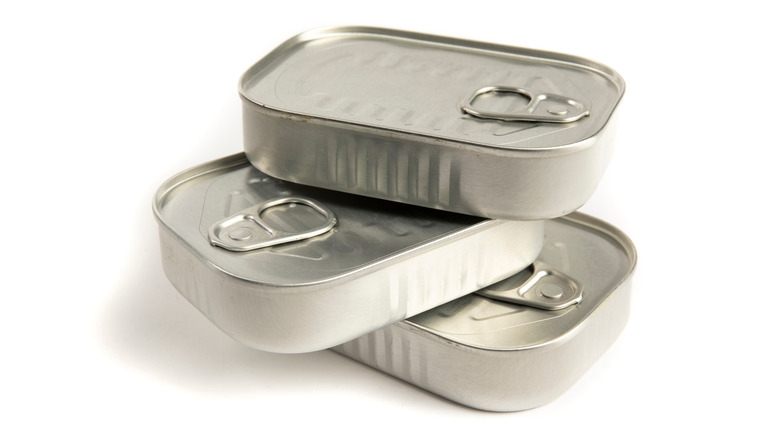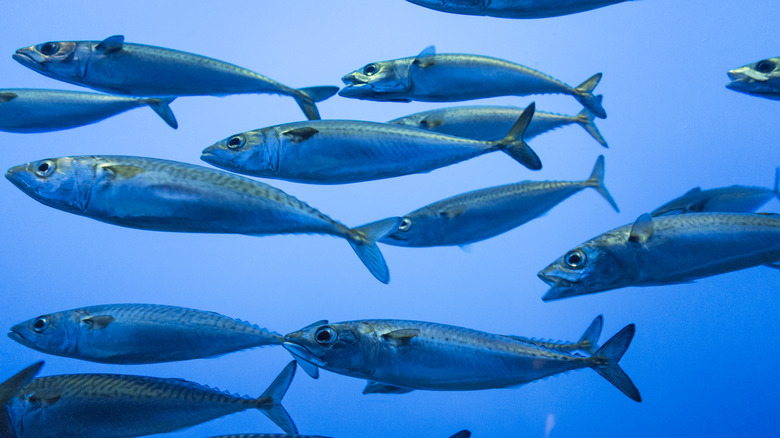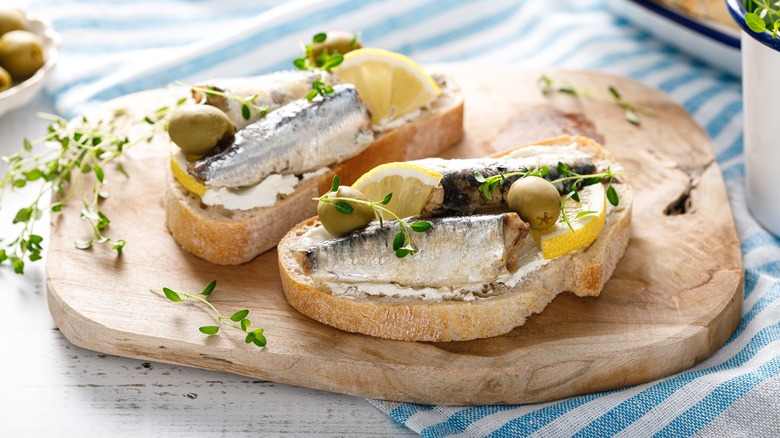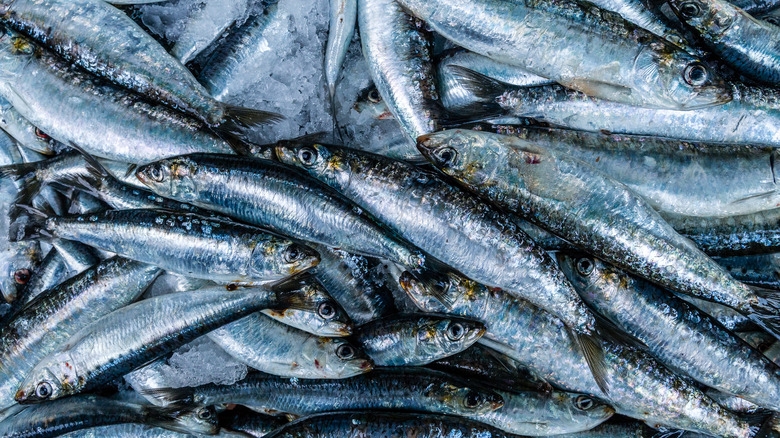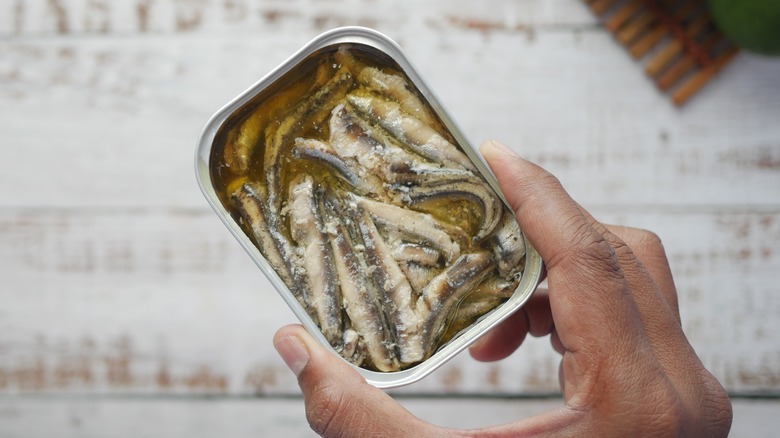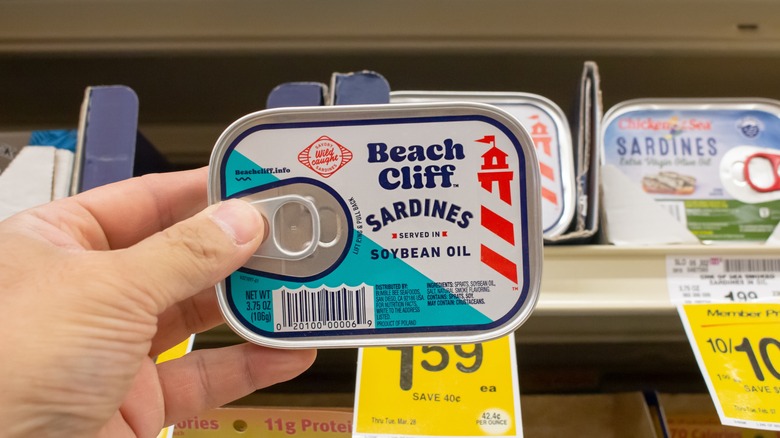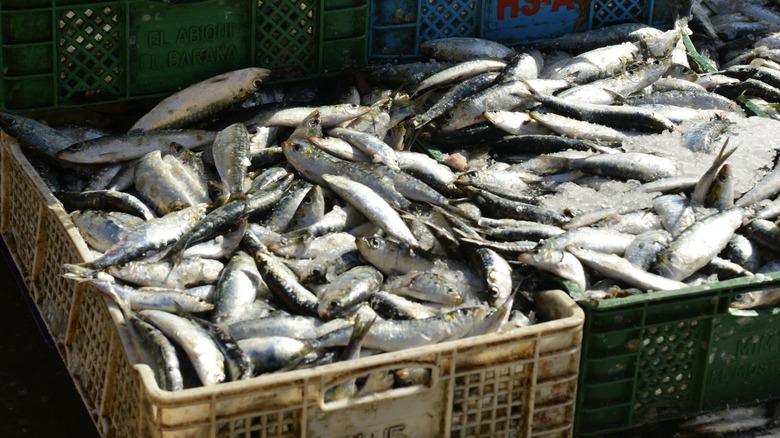12 Facts About Canned Sardines
Sardines are a flavorful, meaty, and nutritious seafood option that can be purchased in a variety of forms. These fish are available whole and fresh, conveniently frozen, and even transformed into a rich paste for spreading onto crispy bread. One form that's often overlooked but is just as tasty and versatile as the fresh variety is canned sardines.
Canned sardines are an amazing ingredient for adding rich flavors and a hearty dose of healthy fats and protein to any plate, all in an incredibly quick and easy to prep form. These small fish have an impressive shelf life, can be enjoyed hot or cold, and sometimes even come in a delicious ready-made sauce. Packing a powerful punch in terms of nutrition, and with so many different ways to prep them, canned sardines have a lot to offer. Plus, they're a fantastic budget-friendly option.
In this article, we take you through 12 fascinating facts about these humble canned fish, while equipping you with all the knowledge you need to prepare a delicious meal with them. So, read on to discover why canned sardines absolutely deserve a place in your pantry.
1. They're classed as an oily fish
Canned sardines are categorized as an oily fish, a term that highlights their high fat content and their richness in omega-3 fatty acids. Omega-3s are essential fats that play a crucial role in many aspects of our health and bodily functions. Unlike some other types of fat, omega-3s cannot be produced by the human body, so they must be obtained through diet. Other types of fish that sit within the oily fish category include salmon, trout, and mackerel.
When done in moderation, consuming oily fish like sardines can have a wide range of health benefits. Firstly, regular intake of omega-3 fatty acids is associated with a lower risk of developing certain conditions, such as cardiovascular disease, rheumatoid arthritis, and dementia. These beneficial fats also contribute to the lowering of cholesterol levels and can help maintain healthy blood pressure. Sardines are also a source of other important nutrients found in oily fish, such as vitamin D and selenium. Vitamin D is essential for bone health and immune function, while selenium plays a role in thyroid health and protecting the body against oxidative stress.
To maximize these health benefits, the American Heart Association recommends eating at least two servings of fish per week, highlighting oily fish in particular. Three ounces of cooked fish is typically classed as one serving.
2. They have a long shelf life
One of the biggest benefits that comes with canned sardines is their impressive shelf life. When you buy fresh fish, this typically needs to be consumed within a few days, but canned sardines will keep for up to three years when stored properly. They make a fantastic pantry staple that's great to stock up on, and simply grab whenever you're in the mood for a nutritious fish-based breakfast, lunch, or dinner.
The longevity of canned sardines is due to the canning process they undergo. This involves vacuum sealing the pre-cooked fish in the cans and then heating them to a high temperature, which kills any potentially harmful bacteria that might be present. The cans are then rapidly cooled to preserve the fish's texture and flavor. Once the canning process is complete, the sardines will stay fresh and safe to eat for an extended period, providing the cans remain sealed and are stored in a cool, dry place.
Opting for canned sardines rather than their fresh counterparts can help to minimize food waste, since there's no fear of them going bad before you've had a chance to use them. Buying them in bulk is entirely feasible, and likely to save you money, too!
3. They don't require cooking
There's no denying that canned sardines are incredibly convenient, and one reason for this is that they don't require cooking. In fact, you can eat them right from the can if you want! This makes them a fantastic option for a quick meal or snack, or at times when you might not have access to a kitchen, serving as a hassle-free way to enjoy a nutritious and tasty meal.
The canning process itself is what makes cooking unnecessary. Sardines are typically steamed or blanched before they're sealed into the cans, which means they're fully cooked and safe to eat as they are. You can toss canned sardines into pasta dishes, salads, sandwiches, dips, or serve them on some crispy crackers, to create a protein-packed dish that requires minimal time and effort to prepare.
Canned sardines are also particularly great to have on hand for situations where fresh food is not easily accessible, such as during emergencies. And if you're going on a hiking or camping trip, they make an ideal source of protein to take along, with their compact, easy to open packaging.
4. They're lower in mercury than other types of canned fish
One worry surrounding the consumption of fish is their potential mercury content. Mercury is a toxic heavy metal that can accumulate in fish, and consuming too much of it can pose health risks, particularly for young children and during pregnancy. It's important to note that certain species of fish contain higher levels of mercury than others, and sardines sit on the lower end of the mercury scale.
Compared with other types of canned fish, like tuna, canned sardines have a much lower mercury content. This is because sardines are small and have shorter lifespans, so they accumulate far less mercury than larger, longer-living fish. According to the FDA, the mercury concentration in sardines is typically 0.013 parts per million (ppm). The fish species most affected by mercury is the tilefish, at 1.123 ppm — almost one hundred times higher than the levels found in sardines!
High mercury levels in the body can have a severe impact on our health, causing a range of neurological issues from numbness and tremors to vision problems. Choosing lower-mercury fish is the best way to minimize the risk of excess mercury build up. By opting for sardines, you can benefit from all the essential nutrients that fish provide, whilst consuming less of this heavy metal. Sardines are a particularly great choice for pescatarians, who rely on fish as a primary protein source, since they can be enjoyed more frequently without consuming high levels of mercury.
5. There are many different forms
Now, before you run to the store to stock up on these amazing canned fish, let us run you through the variety of options you're likely to be presented with. That's right — canned sardines come in a range of different forms, often combined with other complementary ingredients that enhance their rich, meaty flavor.
Whilst often packed simply in water, another common form of canned sardines is those packed in oil. This is typically olive oil, soybean oil, or other vegetable oil, with each giving a slightly different flavor to the fish. Sardines in olive oil are particularly popular, with an arguably superior taste to sardines packed in water, and coming with the added benefits that this heart-healthy oil provides.
If you prefer the taste of sardines in a sauce, there are plenty of options to try. A classic can of sardines in tomato sauce is a delicious option, with the tangy sweetness of the tomato sauce perfectly complementing the oily richness of the fish. Mustard sauce is another popular variety, providing the fish with a distinctive tangy taste. Or, if you're looking for something with a spicy kick, you can also find sardines packed with chili peppers or in hot sauce. Choosing sardines in a ready-made sauce is a brilliant option for when you're short on time, and want to enjoy the fish in a salad, pasta dish, or on a slice of toast without the need for thinking about extra seasonings.
6. Eating them can have anti-inflammatory effects
Thanks to their high omega-3 fatty acid content, incorporating canned sardines into your diet can provide significant anti-inflammatory benefits. Whilst inflammation in the body is normal in some situations, it can sometimes become chronic. Chronic inflammation is linked to numerous health conditions, including heart disease, arthritis, and certain types of cancer.
The results of various studies have demonstrated the anti-inflammatory properties of omega-3. For example, a study by the AHA journal Circulation Research found that taking fish oil supplements with specific omega-3 fatty acids reduced inflammation by increasing anti-inflammatory molecules in the body. These molecules had the effect of boosting immune cells, and decreasing blood clot formation. Another study published in Annals of the Rheumatic Diseases reported that, in a group of middle-aged and older women, those who ate omega-3-rich fish at least once a week had a 29% lower risk of developing rheumatoid arthritis, an inflammatory disease of the joint tissue.
Omega-3s aren't the only anti-inflammatory components of sardines, either. The vitamin D found in these fish has also been shown to reduce inflammation in the body, along with magnesium, potassium, zinc, and taurine.
7. They're particularly high in calcium
Another notable nutritional benefit of canned sardines is their richness in calcium. A typical can of sardines can provide 351 milligrams of this mineral, which is over a third of the daily recommended intake for adults.
Calcium is essential for maintaining strong bones and muscles, as well as healthy teeth, nerve signaling, and the circulation of blood throughout the body. If we don't get enough calcium in our diet, this can lead to weak nails, fragile skin, and the risk of developing osteoporosis. It's particularly important to ensure that young children get plenty of calcium in their diet, to support the development of their bones as they grow. Older men and women will also benefit from adding sardines to their diet, since our bones begin to lose calcium as we age.
The calcium in sardines is particularly beneficial because it comes with additional nutrients such as vitamin D and phosphorus, which are necessary for the absorption and use of calcium in the body. The calcium-rich small bones found in this canned fish are also entirely edible.
8. There isn't just one species of sardine
Believe it or not, the term "sardine" doesn't refer to just one species of fish. Instead, it encompasses several small, oily fish from the herring family. This means that there can be quite a lot of variation amongst the range of canned sardine products out there, with different species bringing slight variations in taste and texture.
There are over 20 species of sardines found in the world's oceans, so fishing vessels will harvest different varieties depending on their geographical location. For example, European sardines are commonly found in the Atlantic Ocean and the Mediterranean Sea, while South American pilchards are typically sourced from the Pacific and Indian Oceans. A sardine's specific species will also dictate its size. Typically, a can of sardines will contain three to four fish, though for some smaller varieties, known as sardinillas, you can fit up to 40 fish in one can. At the other end of the scale, the largest species, called the Atlantic sardine, can grow to over 15 inches in length.
A country that's renowned for its sardines is Portugal, where these fish are often considered some of the tastiest in the world. Portuguese sardines are prized for their rich flavor and high quality, sourced from the warm coastal waters of the Mediterranean, and processed using traditional preservation methods.
9. They can be prepared in many different ways
Canned sardines don't ever have to be boring. While they're perfect for whipping up a quick and simple meal, they can also be incorporated into more elaborate dishes too. These conveniently preserved fish are super versatile, with their rich, savory flavor lending itself well to a variety of other ingredients.
If you love zesty, aromatic, Mediterranean-inspired flavors, try making some sardine and blistered tomato toasts. Here, we crisp up the sardines in a frying pan alongside some garlic and lemon juice, then layer them up on crunchy slices of toast with some balsamic-infused pan-fried cherry tomatoes. Sardines are also a fantastic addition to pasta dishes. Add them whole, or flake the fish into a pasta sauce for plenty of flavor and richness. Or, for a uniquely tasty pizza topping idea, add canned sardines alongside some other veggies and capers. If you're building a nutritious rice or quinoa grain bowl, canned sardines serve as an excellent protein option to combine with the assortment of veggies and a dash of your favorite sald dressing.
Another fun idea is creating a savory grazing board. This could include olives, cheese, veggies, and pickled onions, alongside the opened cans of fish. Canned sardines can even be blended into spreads or dips to make a flavorful appetizer. They'll pair well with creamy yogurt or sour cream, herbs, and spices for a wholesome snack that's perfect for dunking crackers or veggie sticks into.
10. Canned sardines have softer bones
When you tuck into fresh, whole sardines, you generally have to work around the bones, eating the tender, flaky flesh only. However, when it comes to canned sardines, any bones left in the fish tend to be a lot softer. This means they're actually entirely edible and not likely to cause any scratching or irritation when chewed and swallowed.
Although there are some boneless varieties available on the market, most canned sardines contain bones. But, during the sardine canning process, the canned fish is heated to high temperatures. It's this heating that softens up the bones, to the point where they blend relatively seamlessly with the meat of the fish and can typically be consumed without any issues.
What's more, the small, soft bones in canned sardines are an excellent source of calcium, iron, and vitamin D, so picking them out would mean forgoing the nutritional benefits they bring. Plus, eating sardine bones isn't just a healthy choice. It's also an environmentally-friendly practice, since consuming more of the whole fish can help to reduce food waste.
11. They're budget-friendly
Another reason to add canned sardines to your diet is their low cost. These conveniently packaged, pre-cooked fish offer a very affordable way to incorporate high-quality protein, omega-3 fatty acids, vitamins, and minerals into your diet, all without breaking the bank.
Compared to other protein sources like fresh fish, meat, or poultry, canned sardines are significantly cheaper. And despite their lower price, they deliver just as much in the way of nutrition. Because of this, canned sardines can be an incredibly valuable option for those who are health-conscious, but also want to stick to a sensible budget. Sardines are also often cheaper than other types of fish, like salmon or tuna. This is due to their abundance in the oceans, as well as the efficient fishing methods used to catch them, which allows for lower costs. Additionally, being small in size, sardines require minimal processing, often simply removing the head and tail before canning or preserving, which again keeps production expenses low, and translates into cheaper prices for the consumer.
Canned sardines are widely available in most grocery stores and supermarkets. With a range of different canned sardine brands, preparations, and packaging sizes available, you will notice some difference in pricing between the various sardine products. However, buying sardines canned is generally always much more cost effective than opting for fresh or frozen fish. So, don't hesitate to stock up your pantry with this delicious staple.
12. Most canned sardines come from Morocco
Despite Portugal's passion for them, it's actually Morocco that takes the top spot for leading producer canned sardines. Supplying a significant portion of the global market, Morocco's coastal waters have plentiful sardine populations, and the country has become a hub for both fishing and canning.
On Morocco's Atlantic coast, nutrient-rich waters create the perfect environment for sardines to thrive, meaning there's a consistent, healthy supply of fish to harvest. Sourcing from this rich coastline, Morocco is responsible for half of all canned sardines sitting on supermarket shelves around the world, producing a whopping 850,000 tonnes of the fish per year.
The fishing industry is a crucial part of Morocco's economy, providing employment for thousands of people, from fishermen to factory workers. Prized for their high quality, the majority of Moroccan canned sardines are exported to other countries worldwide, and they're particularly popular on the European market.


